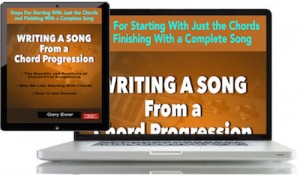It’s common to hear questions posed by those who are relatively new to the world of songwriting that start with the phrase: “Can I…”, or “Is it OK to…”
- “Can I start and end a song in different keys?”
- “Can I change tempo in the middle of a song?”
- “Is it OK to write pop songs that are longer than 6 minutes?”
- “Can I use the same chord progression for the verse and the chorus?”
Practically any experienced writer of songs will tell you, “Let your ears be your guide. There are no rules.” I agree with them. Good music is guided by principles, not rules. It’s true that when you look at pop music from the past 6 decades, you see commonalities between songs — and from those commonalities we infer certain principles that you’d (at least most of the time) be advised to follow.
 If you like starting songs by working with a chord progression, you need to read “Writing a Song From a Chord Progression.” It will give you the pros and cons of this songwriting method, and help you create songs that really work!
If you like starting songs by working with a chord progression, you need to read “Writing a Song From a Chord Progression.” It will give you the pros and cons of this songwriting method, and help you create songs that really work!
But don’t confuse those principles with rules. If we stuck to rules, we’d likely never have a “Bohemian Rhapsody”, “I Am the Walrus”, or anything that ventures outside of what we think of as musical norms.
A rule tells us that we are required to do something in a certain way, and in so doing, the outcome will be predictable. That’s the problem with rules: they give us something predictable, and that’s a problem in the creative arts.
Most songs have a high degree of predictability in the way they sound. It’s why all pop songs from any given era all tend to have a similar sound, and there’s nothing particularly wrong with that. Nothing wrong, because that predictability doesn’t come from following rules, but rather by acknowledging certain principles.
The moment you ask a question that starts with “Can I” or “Is it OK to”, you’re falling into a kind of creative trap that makes you think you don’t have the freedom to do whatever you want to do.
The best way to ensure that you’re following principles and not rules is to listen to a lot of music. The more you listen, the more those songs will serve as guiding examples, and from those songs you’ll develop a way of writing that’s uniquely yours, but guided by other good songs.
So remember: good songwriting is not about following rules. You can safely ignore rules, and turn your attention to the principles that have given us the great songs we listen to.
 Written by Gary Ewer. Follow Gary on Twitter
Written by Gary Ewer. Follow Gary on Twitter
 Thousands of songwriters are using “The Essential Secrets of Songwriting” eBook bundle to polish their songwriting technique. Every aspect of how to make a song better is covered. Stop wasting time — take your songwriting technique to a new level TODAY. Ten eBooks, plus a free one: $37 USD (Immediate download)
Thousands of songwriters are using “The Essential Secrets of Songwriting” eBook bundle to polish their songwriting technique. Every aspect of how to make a song better is covered. Stop wasting time — take your songwriting technique to a new level TODAY. Ten eBooks, plus a free one: $37 USD (Immediate download)











Great post, Gary. I find that a nice way to flip this around and open up your possibilities is to replace the “Can I…” questions with “What if I…” questions. It turns the rule into a stepping stone, and it doesn’t feel like you’re backing yourself into a corner. E.g.
“What if I start and end a song in different keys?”
“What if I change tempo in the middle of a song?”
“What if I to write pop songs that are longer than 6 minutes?”
“What if I use the same chord progression for the verse and the chorus?”
Hi Keith – I love that idea. Starting with “What if I” tends to make us feel more confident in our choices. Thanks for that great suggestion!
Cheers,
-Gary